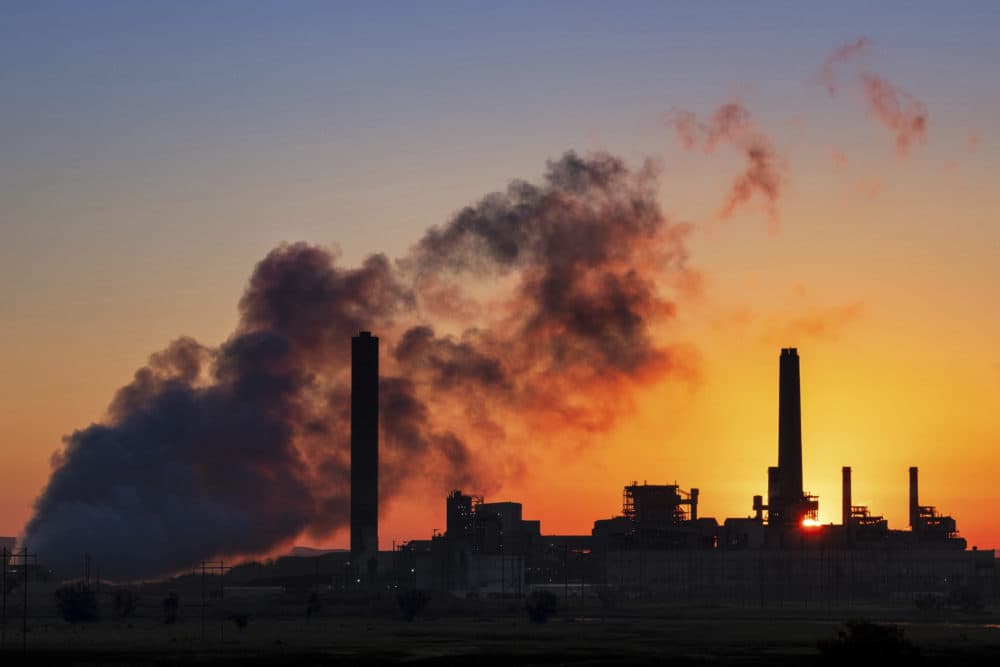Advertisement
Environmental activists say states will have to do more to curb emissions in face of Supreme Court ruling

Environmental activists are reacting to the the Supreme Court's decision regarding greenhouse gas emissions with alarm, saying states will have to fill the void where the federal government is going to be hamstrung.
The high court ruled Thursday that the Environmental Protection Agency does not have the authority to regulate carbon emissions from power plants.
WBUR's All Things Considered host Lisa Mullins spoke with Brad Campbell, president of the Boston-based Conservation Law Foundation, about the decision.
Interview Highlights
On the ruling's impact:
"This is a major blow to [the Environmental Protection Agency's] ability to fight climate change. It's a major restriction in the agency's authority under the Clean Air Act to reduce pollution from power plants and other industrial facilities. So it's a big deal."
On the Supreme Court majority's argument that Congress doesn't give the EPA total authority to regulate carbon emissions from power plants:
"The decision is does not technically take away EPA's authority to regulate greenhouse gas emissions. What it has done is really negated a provision under which Congress, in the Clean Air Act, said ... EPA has the authority to identify what the best system of reducing emissions is. ... EPA [previously] decided that the most effective way to reduce emissions from power plants ... is to shift generation to renewable sources. And the court essentially said that that approach to emissions reductions ... is beyond EPA's authority. And the problem with that is that Congress routinely gives agencies broad authority, precisely so that the agencies can address problems — threats to human health and the environment — that Congress can't foresee or doesn't have the technical know how to resolve."
On what this means for Massachusetts and New England, where the Regional Greenhouse Gas Initiative is in place to limit emissions:
"This decision really puts the ball back in the court of the states and the region, and even local governments. to take meaningful action on climate. The good news is that five out of our six New England states have strong climate laws in place. The bad news is that Massachusetts, which has had its law in place the longest — and which the legislature has recently strengthened — the implementation of that law has been very slow ... And, you know, other states that also have climate laws in place in New England — New Hampshire being the only one that doesn't — really are looking to Massachusetts to take the lead, having had their climate law in place the longest."
On whether the Northeast will bear a disproportionate impact from the ruling, due to air pollution that sweeps across the country and other factors:
"New England and the Northeast really do bear disproportionate impacts from climate change — particularly the vulnerability to rising seas, more intense storms, more intense rains. Those are already affecting the the the cleanliness of the air we breathe and our New England waters ... And that impact is, of course, even greater in communities of color and low income that are hit first and worse by not only climate change, but also other pollutants — soot and smog ... And the importance of action here in New England to reduce emissions is not just the actual emissions reductions that occur in the region, but really the modeling and the work of designing the tools, putting in place the policies and identifying the solutions we need in order to reduce emissions economy wide. ... not only will that influence other states, but it will also help generate the technologies and the innovation we need ... to make sure this region benefits from economically from the new new technologies, the new developments that are needed for a clean energy transition."
WBUR sought comment from Gov. Charlie Baker's office in response to Campbell's claim that the administration hasn't been aggressive enough in adopting policies and programs to reduce carbon emissions. We haven't received a response. But today state officials released a plan to meet emissions targets for the years 2025 and 2030.
This segment aired on June 30, 2022.

